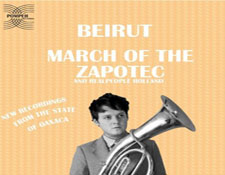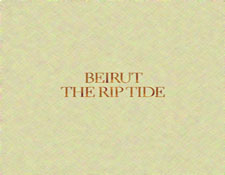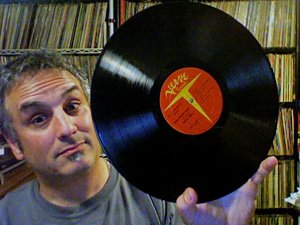It’s the time of year for saving money!

I
had one of those moments a month or so ago in Streetlight Records here in San
Francisco where a song comes on the store’s sound system that catches my
breath, sends a shudder down my spine and instantly hooks up with my DNA
somehow. In the past, I have been
introduced to some wonderful bands this way including The Cure, The Smiths,
Queens of the Stone Age and some others. This time the sound I heard was
mariachi horns and pump organ pulsating under this yelping voice — which
reminded me of a young Emitt Rhodes being dangled precariously by an evil
villain from a tall building waiting for Superman to rescue him. That sound
turned out to be a band called Beirut. I
have since purchased three of their albums, two on vinyl LPs.

March of the Zapotec was the record being played
that day in the record store and it turned out to be a two disc affair, parts
of it recorded in Teotitlan, Oaxaca, Mexico. Audiophiles will probably like
this recording because there are almost no electric instruments on the album
which is filled with tubas, trumpets, trombones, accordions, saxophones,
clarinets, parade drums and so on. Not exactly the daily faire one would expect
from a group emanating from Brooklyn, NY. The brainchild of Zach Condon, the
music has and old-meets-new feeling that is somehow oddly European flavored
despite the distinctly Mexican influences. Taken as more of a whole, the
album’s two sides reveal a composer with very distinct concept of arrangement.
I love the flavor of “The Shrew” which starts out very plaintive and
then kicks in with the full Mariachi band to the point where you can really
feel the parade drum and tubas pushing air from your speakers.
The
two discs are short, but I can understand why they split it up instead of
cramming them onto one. The second disc, individually titled Real People Holland, plays more like a
set of demos by Condon done on his computer. Somehow it all fits together, with
titles like “My Night With The Prostitue From Marseille” and
“The Concubine” (with its toy piano and accordion textures). Not
surprisingly, putting Condon’s voice into a more traditional pop band structure
makes it sound a bit more pedestrian, akin to the yelping clean cut sound you
might hear on an old 80s record by Haircut One Hundred or The Housemartins.
Good idea to stick with the unusual instrumentation, Zach; otherwise you might
sound like any other pop band this side of The Postal Service.
The
vinyl pressing on this is good, probably 140-gram, quiet and well centered.

Riptide, Beirut’s 2011 album,
continues some of that Mariachi flavor found on 2009’s March of the Zapotec. A bit more indivual-song-oriented, the album
still plays like some alternate universe Tom Waits album, where Tom’s gruff
Beelzebub flavored characters are replaced by more angelic sounding sorts
teetering on the brink. Some of the arrangements are just wonderful, like on
“Paynes Bay,” which has a tuba-trumpet-french horn-filled breakdown
in the middle which feels like it could be background music for an old Betty
Boop cartoon. The title track starts of sounding like a Carol King tune with
just piano but soon gives way to a more exotic flavors including cello to carry
the lilting, soft, hook-free melody along.
This
is great rainy day music to listen to while reading old letters from a lost
love.
The
fairly thick, probably 150-gram vinyl pressing of The Riptide sounds much bigger and rounder than the decent but
brighter 320 kbps MP3 downloads (free with the LP purchase). Condon’s voice
jumps out of the mix more naturally on vinyl backed by the haunting muted
quality of real acoustic instruments playing in a room (not necessarily close
mic’d, at least that is how its mixed; I do not know for sure how it was recorded
technically).
Overall,
Beirut’s music sounds particularly majestic when you turn it up loud on vinyl.
You can feel the difference on tracks like “Vagabond,” where the bass
drum pulsates nicely out of the speakers on vinyl (you lose some of the thump
on the MP3s). This is a lovely track with its harpsichord touches and violin
textures. “Port of Call” sounds fabulous with its double-tracked
Ukulele strumming, interlocking piano chording and glockenspiel punctuation
marks setting the stage for the return of the horn section. The MP3s lose
something in translation, some of that mid-range lushness is gone and the
digital edge surrounding Condon’s voice reduces some of the impact this music
makes.
Clearly
this is a special album for the band and they even put some extra special
effort into the album cover which has gorgeous real linen fabric on the cover
with copper foil text printed on it. I haven’t seen a cover like this since
some old 1950s-era special edition collections I might have found at a garage
sale.
Beirut
is building something distinctive here. I’m looking forward to digging into
their earlier records and hopefully seeing them perform live sometime soon.
Good
stuff!
Mark Smotroff is a
freelance writer and avid music collector who has worked for many years in
marketing communications for the consumer electronics, pro audio and video
games industries, serving clients including DTS, Sega, Sony, Sharp, AT&T
and many others. Mark has written for EQ Magazine, Mix Magazine,
Goldmine/DISCoveries Magazine, BigPictureBigSound.com, Sound+Vision Magazine
and HomeTechTell.com. He is also a musician / composer who’s songs have been
used in TV shows such as Smallville and Men In Trees as well as films and
documentaries. Mark is currently rolling out a new musical he’s written.
www.smotroff.com






